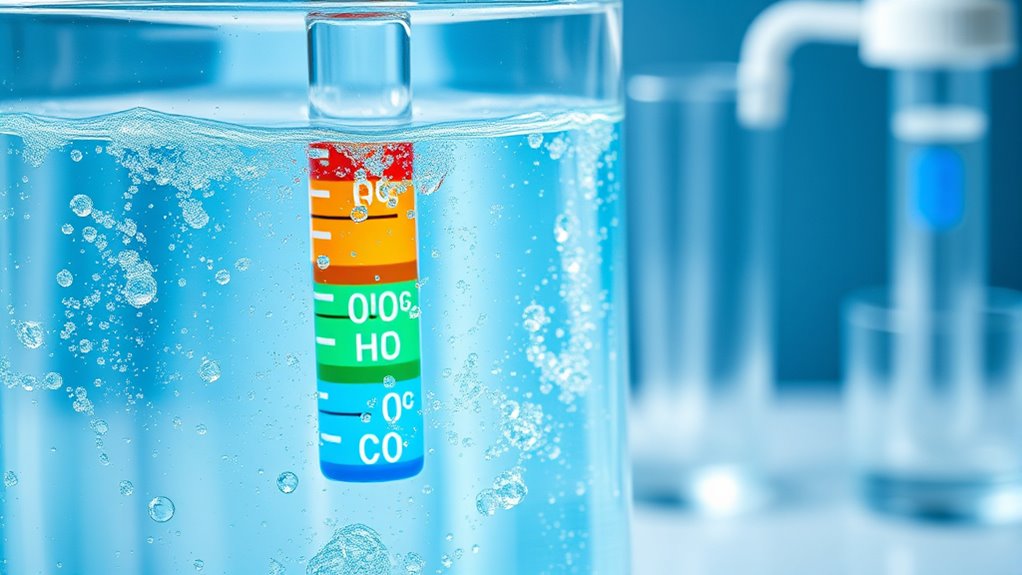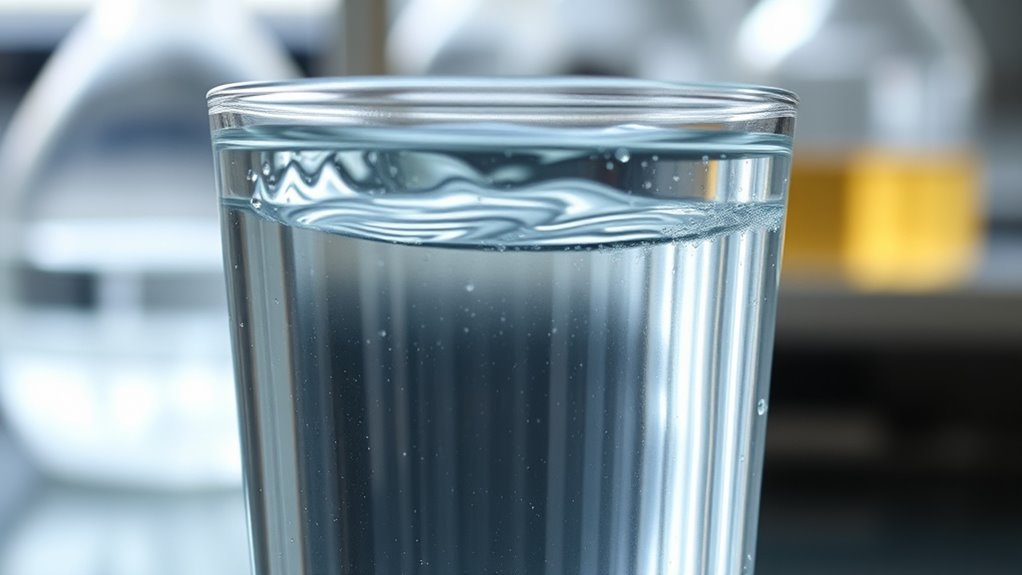Your perception of water’s flavor depends on its chemistry, especially pH balance and mineral content. Slight variations in pH can make water taste sharper or smoother, while minerals like calcium, magnesium, and sodium add complexity—think bitter, salty, or metallic notes. Different sources offer unique profiles that influence how invigorating or satisfying the water feels. If you’re curious about how these factors shape water’s taste, there’s more to uncover about the fascinating chemistry behind it.
Key Takeaways
- Mineral content in water influences taste, adding bitterness, saltiness, or metallic notes.
- pH levels affect flavor perception, with acidity or alkalinity altering water’s sharpness or smoothness.
- Source and mineral composition determine the overall flavor profile and mouthfeel of the water.
- pH adjustments, natural or artificial, can modify water’s taste and perceived freshness.
- The interaction of minerals and pH shapes the complex chemistry behind water’s flavor perception.

Have you ever wondered what makes water so uniquely reactive and essential? It all comes down to its chemistry. The pH balance of water plays a pivotal role in determining how it interacts with your senses and its overall quality. Pure water has a neutral pH of 7, but even slight variations can influence its perceived flavor and how it feels on your palate. Slightly acidic water, with a pH below 7, might taste sharper or more tangy, while alkaline water, with a pH above 7, may seem smoother or more rounded. These subtle shifts in pH can change the way you experience water, making it taste different from one source to another. Understanding water chemistry helps you appreciate why different sources taste distinct. The mineral content is equally important; water naturally dissolves minerals from rocks and soil, and these minerals add complexity to its taste. For example, calcium and magnesium often lend a water a slightly bitter or chalky note, which some people find invigorating, especially in mineral waters. Conversely, high sodium content can give water a salty or briny flavor, which might be more noticeable in certain regions or water sources. Trace minerals like iron or copper can create metallic or earthy undertones, affecting how you perceive the water’s freshness. The balance of these minerals, along with their concentrations, has a direct impact on the perceived quality and flavor profile of your drinking water. Understanding water chemistry helps you appreciate why different sources taste distinct. Tap water, filtered water, spring water, and mineral water each have unique compositions that influence their flavors. For example, water with higher mineral content tends to have a more pronounced taste, while purified water with minimal minerals often appears bland but is appreciated for its neutrality. Similarly, pH adjustments through natural or artificial means can alter water’s flavor, making it more palatable or more acidic depending on your preferences. In essence, your experience of water’s flavor hinges on its chemistry. The pH balance and mineral content work together to shape how water feels and tastes in your mouth. Recognizing these factors encourages you to become more attentive to the subtle differences between sources and understand why some water feels more invigorating or tastes more satisfying than others. So next time you take a sip, consider the complex chemistry behind that simple act, and appreciate the reactive, essential nature of water.
Frequently Asked Questions
How Does Mineral Content Influence Water’s Perceived Taste?
You’ll notice mineral content greatly influences water’s taste perception. A balanced mineral profile, like calcium and magnesium, can add a pleasant, subtle flavor, while excess minerals such as iron or sulfur may cause undesirable tastes. When mineral balance is just right, the water tastes fresh and clean, but too many minerals can make it metallic or bitter. Adjusting mineral levels helps optimize flavor and enhances your overall drinking experience.
Can Water Chemistry Affect the Health Benefits of Drinking Water?
Water chemistry can considerably affect the health benefits of drinking water by influencing its pH balance and water minerals. When you consume water with ideal pH levels and beneficial minerals, you support hydration, digestion, and mineral replenishment. Conversely, imbalanced pH or excessive harmful minerals can diminish these benefits. You should prioritize clean, well-balanced water to maximize health advantages, ensuring that your water’s chemistry promotes overall well-being.
What Role Do Ph Levels Play in Perceived Water Flavor?
Your perceived water flavor is directly affected by pH levels, as they influence flavor perception. When water has a balanced pH, around 7, it usually tastes neutral and clean. If the pH is too low (acidic) or too high (alkaline), you might notice a sour or bitter taste. Maintaining proper pH balance guarantees your water tastes fresh, making it more enjoyable and appealing to drink regularly.
How Do Contaminants Alter the Sensory Qualities of Water?
Contaminants notably alter your water’s sensory qualities by introducing unusual tastes, odors, and sometimes visual changes. They disrupt the pH balance, making water taste sour or metallic, which impacts your perception of freshness. Contaminant impacts can also cause a bitter or chemical flavor, making water less appealing. To guarantee good flavor and safety, it’s crucial to test water regularly and address any contamination issues promptly.
Are There Regional Differences in Water Chemistry and Taste?
You might notice regional differences in water taste, and there’s truth to the idea that water chemistry varies across areas. Regional taste preferences and cultural drinking habits influence how you perceive water’s flavor. For example, mineral-rich water in some regions can taste more robust, while others prefer softer water. These differences affect your sensory experience, highlighting how local geology and habits shape the way you enjoy water daily.
Conclusion
Understanding water chemistry helps you grasp how minerals influence flavor, making your drinking experience more enjoyable. Did you know that over 80% of the world’s population consumes water with mineral levels that affect taste? By paying attention to chemistry, you can select water that complements your preferences or even improve its flavor through simple adjustments. Ultimately, recognizing the link between chemistry and taste empowers you to enjoy water that’s not only pure but also perfectly suited to your palate.









